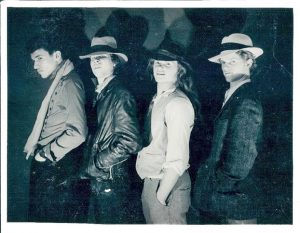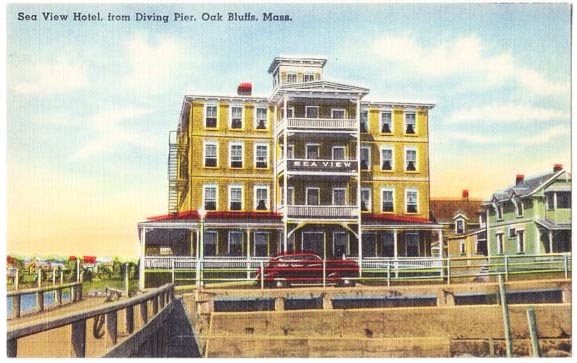Everyone has a story of an unforgettable summer on Martha’s Vineyard. Island musician Mike Benjamin shares his.
The dance floor had a soulful patina, stripped down to raw oak then stained by oceans of spilled drinks and a topcoat of brow-dripped, danced-off, muggy summer sweat. It was polished and buffed by countless crowds, shoes optional, dancing to live blues, rock ’n’ roll or 70s funk in the dimly lit smoky room. The Seaview, circa 1980, part Southern-style chitlin circuit roadhouse, part fisherman’s watering hole, part New England seaside hotel.

Loretta Balla owned the Seaview, and it was staffed by a collection of characters whom she took care of with one part motherly kindness and a big dose of don’t even think of f___ing with me. Loretta, then in her mid-50s, was a dish in her day, and for a few bucks you could buy a Seaview T shirt with a silkscreen image of her posing pinup-style, busty and bare-legged in her 20s, when she was working as a coat-check girl in a New York City nightclub.
One of the regulars at the bar was a wiry and wily former jockey named Oliver Perry, a.k.a. Johnny Seaview. Loretta was rumored to be Johnny’s girlfriend, although I always suspected he was more like one of her projects.
Johnny, a Stetson perched proudly on his head and clutching a Miller High Life, was always ready to dance with a girl half his age or pick a fight with a guy twice his size. Leading with his chin, he shuffled his unique version of — was it the bolero or was it a solo tango, cowboy boots twirled heel-to-toe, toe-to-heel.

In addition to once being a jockey, Johnny was a Marine at 17, serving in WWII, and then became a tree surgeon by trade. He was only 5 feet 5 inches tall, but he always had a larger-than-life tale to tell. Wherever he was, on the ferry, at the grocery store, or late night in a bar, he preached his parables and riddles in a raspy bass, his unique timbre commanding attention.
Johnny was a shameless flirt, an eager entertainer who loved to hold court. One evening, while ranting about the meaning of love to an audience of young women, one of his appreciative listeners asked, “But Johnny, you love your dog, right?” He looked her square in the eye, cocked his head, and with a smile he barked, “My dog is self-evident.” He had a quick and quirky answer for any question put to him.

Once, years later, I picked him up hitchhiking. He cut a fine figure standing by the side of the road with a chainsaw slung over one shoulder, a long length of rope over the other, tree-climbing harness around his legs and waist, and a bouquet of flowers in his hand. I had to stop and give him a ride. Over the next few minutes he filled me with accurate accounts of the latest news, current events and his political opinions. This was the sober, articulate Johnny Seaview, well-read and informed. The flowers were “for a beautiful woman,” he explained as his 75-year-old frame sprang out of my car. He strutted off, chin jutting forward, en route to the top of a tree but first, a quick stop to deliver the flowers: “It’s a way to show your appreciation for the opposite sex,” he said. I imagined him on the doorstep of one of the many women he fancied, making his floral offering accompanied by a clever rhyme.
In 1981, I had just finished high school and had convinced a few of my friends and bandmates to chip in and rent a house on the Island for the summer. We were optimistic, hoping to book gigs all summer, but now it was already mid-June and there was not a bit of ink on the calendar. I’d made a trip earlier that spring, dropping off promo kits to places like Lou’s Worry, the Boston House, the Colonial Inn, and of course the Seaview. Manila envelopes stuffed with an 8 by10 glossy picture and a Memorex cassette tape with the band’s name, “Kitch ’n Sync,” scrawled on the label. When I delivered to the Seaview, Loretta was something less than welcoming. “We’re all booked up, but we’ll see,” she grumbled.

Our summer rental was an unfinished, small three-bedroom cape off Tea Lane in Chilmark, $3,500 for the season. Plywood floors and untaped sheetrock, no doors or trim. Plenty of space for four scruffy teenagers, our girlfriends, a few other friends, frequent visitors, and our 16-year-old roadie Charlie, who spent the summer on the beat-up couch in the living room. Anywhere from eight to 15 people found nightly refuge, unless of course we were hosting a party. And as you can imagine, we kept the place spotless!
One late June afternoon, I picked up the phone and Loretta was on the line. She was not one to mince words: “You kids are playing here tonight!” Not, “Good afternoon, is your band available for an engagement this evening?” This was an order. I later learned that her entertainment for the evening had just canceled; obviously we were the last resort. And naturally we were glad to oblige. Before she hung up, she asked, “How old are you kids?” She undoubtedly was taking a closer look at the fresh faces on our 8 by10 glossy. I assured her we were all 18, the legal drinking age at the time, and a few of us weren’t quite there yet, but I figured we’d cross that bridge when we came to it. She added, “Make sure you kids bring your IDs with ya!”
Later that evening she called our bluff: “Let me see those IDs,” she demanded. I mumbled something like, ”Oh … ya … sorry, we forgot to bring them … we’ll bring ’em in next time.” This was an exchange that went on all summer, but the extent of our youth was never revealed.
Inside Loretta’s gruff exterior was a charitable heart. One night at the end of the summer, she called me to the bar in her usual yell-speak. I walked over to her, expecting a reprimand; maybe she was mad we didn’t have our IDs again. She took me aside, leaned in, and pointed a shaking finger at me. I stood braced for the worst. “Mike … this is for you,” she said. She handed me $200 above the band’s pay, and said, “Make sure you stay in school, OK!” That was Loretta’s softer side, and I was deeply touched by her unexpected gift.

The end of each night at the Seaview was announced by Loretta’s bell, an old fire alarm kind of bell mounted on the wall above her back-bar throne. There were two striking hammers, one on either side of the bell and when you yanked the strap both hammers struck in unison loud enough to raise the dead. “DRINK UP!” Loretta would shout, followed by, “GET OUTTA HERE … LET’S GO … YOU CAN’T STAY HERE …” Any patrons who ignored her warning would feel the firm tap of her green shillelagh. Further hesitation resulted in a stern tug on the ear, up and out toward the door — she could bounce even the toughest drunken fisherman.
A few of the girls who lived with us that summer were carless, and sometimes had to walk the mile or so down the dirt road to Middle Road and hitch to work. Tea Lane was a narrow, pothole-riddled washboard back then; a car barely had room to pass a pedestrian. Dan Aykroyd lived nearby, and often gave the girls a ride if he was passing by. One day he asked one of them, “Ah … you live in that house with the band? I heard ’em rehearsing; I’d like to play harp with ’em sometime.”
She passed the request on to us, and of course we were more than willing to oblige. A few nights later he sat in with us at the Seaview. With just one sit-in from Dan, fresh with his success with the Blue Brothers, we were upgraded from scraggly high school band to cool dudes that hang out with the Blues Brothers. Not that we ever actually did, but perception worked in our favor that summer and helped us fill the calendar with gigs.
One afternoon, one of our housemates caught a ride with Dan and complained that our house was a pigsty, trash bags piling up, dishes in the sink. The next day Dan stormed in unannounced, Ghostbuster-style, in full white hazmat suit and gas mask, toting a fire extinguisher charged with some sort of disinfectant. We had been piling up our trash bags by a back door leading to an unfinished deck. In a matter of two minutes he’d pushed the bags out the door, maggots and all, into his waiting pickup truck, discharged the disinfectant and disappeared without a word. It was one of those “did that just happen” moments.

The Seaview was built around the turn of the last century. Loretta purchased it in 1945 for a whopping $20,000, and for the next 40 years it was open for business as the Seaview Hotel Co. Originally it housed a fancy ballroom with chandeliers, and was often filled with guests in evening gowns and tuxedos. Across the street, a swimming pier stretched out past the shores of what’s known as Inkwell Beach and into the waters of Vineyard Sound. By the time I came to know her as a teenager, decades of hard weather and neglect had left their mark.
Loretta finally sold the Seaview in 1986 for $1,000,000. She split her time in retirement between West Palm Beach and Fairhaven. I played my last gig there in late fall of that year, and although she was excited to spend her winters in the Florida sun, I could hear a bittersweet note in her voice when she told me, “They’re gonna tear it down, Mike.”
She told me the new owners had led her to believe that they were going to renovate the place, but Loretta learned that they had plans to raze it. Although I’m sure the building was beyond repair, I still lament its demise as I drive by the condos that stand in its place.
The old Seaview had quite a run, from evening guests in the 1940’s dressed to the nines, thru the 1960’s which I can only imagine and finally to the 1980’s with Johnny Seaview on the dance floor. A lot of great music blasted out of those walls: Kinship, Johnny Hoy, Chico and the Men, Taylor Made, Prime Rib Band to name a few. I’m lucky to have been there, in that special place in time, scraggly high school band in tow, playing music under the roof of Loretta Balla’s Seaview.




